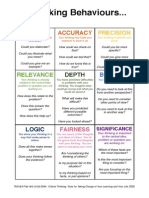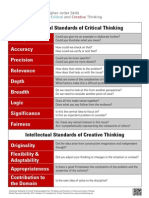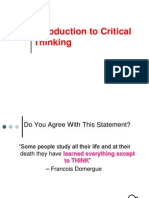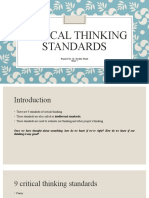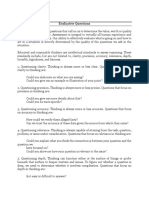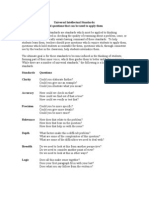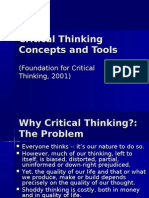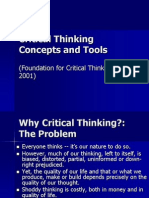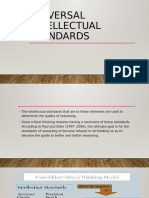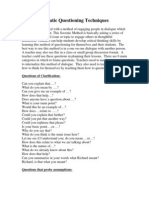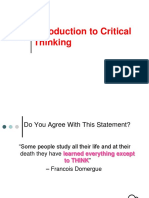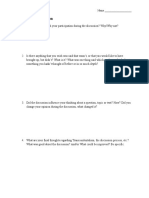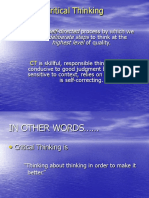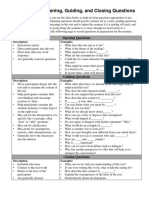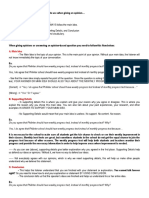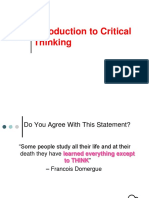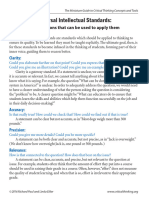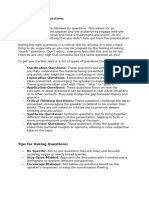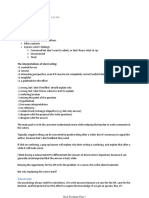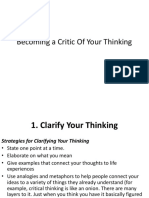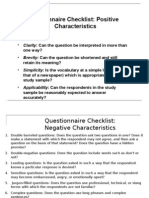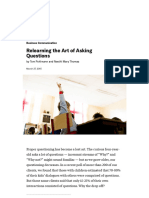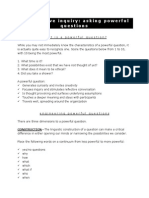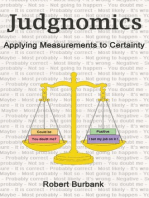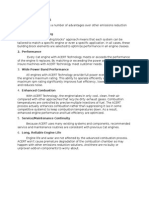0 ratings0% found this document useful (0 votes)
16 viewsCan This Point Be Expressed in Another Way?
Can This Point Be Expressed in Another Way?
Uploaded by
Srikanth ShankarThe document outlines several important intellectual standards for evaluating statements and arguments: clarity, accuracy, precision, relevance, significance, depth, breadth, logic, and fairness. Each standard is accompanied by a question to help assess whether a statement meets that particular standard.
Copyright:
© All Rights Reserved
Available Formats
Download as DOCX, PDF, TXT or read online from Scribd
Can This Point Be Expressed in Another Way?
Can This Point Be Expressed in Another Way?
Uploaded by
Srikanth Shankar0 ratings0% found this document useful (0 votes)
16 views2 pagesThe document outlines several important intellectual standards for evaluating statements and arguments: clarity, accuracy, precision, relevance, significance, depth, breadth, logic, and fairness. Each standard is accompanied by a question to help assess whether a statement meets that particular standard.
Original Description:
standard
Original Title
Intellectual
Copyright
© © All Rights Reserved
Available Formats
DOCX, PDF, TXT or read online from Scribd
Share this document
Did you find this document useful?
Is this content inappropriate?
The document outlines several important intellectual standards for evaluating statements and arguments: clarity, accuracy, precision, relevance, significance, depth, breadth, logic, and fairness. Each standard is accompanied by a question to help assess whether a statement meets that particular standard.
Copyright:
© All Rights Reserved
Available Formats
Download as DOCX, PDF, TXT or read online from Scribd
Download as docx, pdf, or txt
0 ratings0% found this document useful (0 votes)
16 views2 pagesCan This Point Be Expressed in Another Way?
Can This Point Be Expressed in Another Way?
Uploaded by
Srikanth ShankarThe document outlines several important intellectual standards for evaluating statements and arguments: clarity, accuracy, precision, relevance, significance, depth, breadth, logic, and fairness. Each standard is accompanied by a question to help assess whether a statement meets that particular standard.
Copyright:
© All Rights Reserved
Available Formats
Download as DOCX, PDF, TXT or read online from Scribd
Download as docx, pdf, or txt
You are on page 1of 2
INTELLECTUAL STANDARDS
Some of the most important intellectual standards are:
Clarity: If a statement is unclear, we cannot determine if it is accurate or
even relevant.
Ask yourself this question: Can this point be expressed in another
way?
Accuracy: A statement may be clear, but not accurate.
Ask yourself this question: How can the statement be checked?
Precision: A statement can be both clear and accurate, but not precise.
Ask yourself this question: Are more details available?
Relevance: A statement can be clear, accurate, and precise, but not
relevant to the question at issue.
Ask yourself this question: How is that connected to the question?
Significance: Even if a statement is relevant to the question at issue, it
may not be significant.
Ask yourself this question: Will this really make a difference in the
outcome?
Depth: Even a good statement can be superficial.
Ask yourself this question: Does my answer address the
complexities of the problem?
Breadth: Certain topics may be so complex that different view points
sound completely different.
Ask yourself this question: Do I need to look at this from another
point of view?
Logic: When we think, we bring many separate thoughts together into
some order. The combination of thoughts must be mutually supporting.
If they are not, they are not logical.
Ask yourself this question: Does all this make sense together?
Fairness: While life isn't actually fair, if we truly want the best result
from our thinking we must examine all the evidence impartially.
You might also like
- The Art of QuestioningDocument51 pagesThe Art of QuestioningESTELITA ISABEL VALDEAVILLA-LLANITA98% (51)
- 9 Thinking BehavioursDocument1 page9 Thinking BehavioursMaria MarreroNo ratings yet
- Art of Socratic QuestioningDocument3 pagesArt of Socratic Questioningakutluay100% (4)
- Can This Point Be Expressed in Another Way?Document2 pagesCan This Point Be Expressed in Another Way?Srikanth ShankarNo ratings yet
- Universal Intellectual StandardsDocument2 pagesUniversal Intellectual StandardsBenjamin DavisNo ratings yet
- Socratic Questioning TechniquesDocument5 pagesSocratic Questioning Techniquesivonelobof100% (3)
- Intellectual StandardsDocument3 pagesIntellectual Standardsapi-432541218No ratings yet
- Intellectual Standards Poster Qrcode 1Document1 pageIntellectual Standards Poster Qrcode 1api-268597824No ratings yet
- CH 1-NewDocument58 pagesCH 1-Newsay0kieNo ratings yet
- Why Critical ThinkingDocument23 pagesWhy Critical ThinkingBambang Q-aneesNo ratings yet
- Critical Thinking SkillsDocument3 pagesCritical Thinking SkillsLainey Fajardo100% (1)
- Shaping The Way We Teach EnglishDocument13 pagesShaping The Way We Teach Englishapi-27579175No ratings yet
- Universal Intellectual StandardsDocument2 pagesUniversal Intellectual StandardsPatrick Stalter100% (1)
- Evaluating Thinking Through Intellectual StandardsDocument24 pagesEvaluating Thinking Through Intellectual StandardsHanan WaerNo ratings yet
- Critical Thinking Standards - Week 7Document13 pagesCritical Thinking Standards - Week 7Alicia100% (1)
- Lesson 2 - Evaluative QuestionsDocument2 pagesLesson 2 - Evaluative Questionsnanno manobanNo ratings yet
- Taken From Paul, R. and Elder, L. (2010) - Foundation For Critical Thinking, Online at Website: Standard Questions Explanation ClarityDocument2 pagesTaken From Paul, R. and Elder, L. (2010) - Foundation For Critical Thinking, Online at Website: Standard Questions Explanation Clarityapi-292487185No ratings yet
- Intellectual StandardDocument2 pagesIntellectual Standardwaqarali78692No ratings yet
- Critical Thinking Concepts and ToolsDocument9 pagesCritical Thinking Concepts and ToolsRajesh PalNo ratings yet
- Module 1 PsychologyDocument13 pagesModule 1 PsychologyShafiyah ShahilanNo ratings yet
- Socratic Seminar Guidelines and RubricDocument4 pagesSocratic Seminar Guidelines and RubricTazreef AliNo ratings yet
- Critical Thinking Concepts and ToolsDocument9 pagesCritical Thinking Concepts and ToolsDragos BodeaNo ratings yet
- Questions For A Socratic DialogueDocument4 pagesQuestions For A Socratic DialogueInami B.No ratings yet
- Critical Thinking Module II Part 2Document40 pagesCritical Thinking Module II Part 2Vibha HegdeNo ratings yet
- Socratic Questioning Techniques: Questions of ClarificationDocument6 pagesSocratic Questioning Techniques: Questions of Clarificationsunilmba2004No ratings yet
- Critical Thinking Chapter 1 PDFDocument63 pagesCritical Thinking Chapter 1 PDFDesny LêNo ratings yet
- Discussion Reflection TranscendentalismDocument2 pagesDiscussion Reflection Transcendentalismapi-252069942No ratings yet
- Critical Thinking: Self-Directed Deliberate Steps Highest LevelDocument11 pagesCritical Thinking: Self-Directed Deliberate Steps Highest LevelMalisa LukmanNo ratings yet
- Art of Socratic Questioning 2Document3 pagesArt of Socratic Questioning 2akutluay100% (1)
- Developing Opening, Guiding, and Closing QuestionsDocument2 pagesDeveloping Opening, Guiding, and Closing QuestionsClaudia Bestor100% (2)
- Methods of Philosophy: "Critical Thinking"Document24 pagesMethods of Philosophy: "Critical Thinking"MaryKtine SagucomNo ratings yet
- Giving Your Own OpinionsDocument2 pagesGiving Your Own OpinionsDjatTanNo ratings yet
- CH 1-NewDocument58 pagesCH 1-NewGum JamesNo ratings yet
- Mini Guide - Intellectual StandardsDocument1 pageMini Guide - Intellectual Standardsethan.raginNo ratings yet
- Taxonomy of Socratic QuestioningDocument2 pagesTaxonomy of Socratic Questioningapi-313303035100% (1)
- Notes From "Critical Thinking - Concepts and Tools" by Dr. Richard Paul and Dr. Linda ElderDocument1 pageNotes From "Critical Thinking - Concepts and Tools" by Dr. Richard Paul and Dr. Linda Elderapi-285840727No ratings yet
- The Art of Effective Questioning: Asking The Right Question For The Desired ResultDocument25 pagesThe Art of Effective Questioning: Asking The Right Question For The Desired ResultAnaliza Yanoc RabanesNo ratings yet
- BAS04 Asking Questions HandoutDocument2 pagesBAS04 Asking Questions Handoutsem3300No ratings yet
- A Theory ofDocument5 pagesA Theory ofooker777No ratings yet
- Becoming A Critic of Your ThinkingDocument13 pagesBecoming A Critic of Your ThinkingPatrick AnthonyNo ratings yet
- Questionnaire Checklist: Positive CharacteristicsDocument3 pagesQuestionnaire Checklist: Positive Characteristicsmalyn1218No ratings yet
- Final Compiled PDFDocument47 pagesFinal Compiled PDFhassanraza15888No ratings yet
- Pohlmann and Thomas, 2015 - Relearning The Art of Asking QuestionsDocument4 pagesPohlmann and Thomas, 2015 - Relearning The Art of Asking QuestionsDarshanNo ratings yet
- Research Methods: Designing and Writing Effective SurveysDocument44 pagesResearch Methods: Designing and Writing Effective SurveysEmaanNo ratings yet
- Relearning The Art of Asking QuestionsDocument5 pagesRelearning The Art of Asking QuestionsVaaniNo ratings yet
- English: Quarter 2 - Module 2Document15 pagesEnglish: Quarter 2 - Module 2Adrienne Dave MojicaNo ratings yet
- Quarter 2 English 10 Hybrid Module 2Document17 pagesQuarter 2 English 10 Hybrid Module 2Sylvester PerezNo ratings yet
- AI - Powerful QuestionsDocument4 pagesAI - Powerful QuestionsCorreo100% (1)
- Interviewing TechniquesDocument20 pagesInterviewing TechniquesMary Joyce TalamanteNo ratings yet
- Essay StructureDocument16 pagesEssay StructureCònGìBằngNo ratings yet
- Eng10 Q2 M2-Argumentative-TextDocument17 pagesEng10 Q2 M2-Argumentative-Textrafaelenzo.cabidesNo ratings yet
- Paper Writing TipsDocument4 pagesPaper Writing TipsDonNo ratings yet
- Writing Task-2 FreshersDocument85 pagesWriting Task-2 FreshersshivamNo ratings yet
- Solo Taxonomy: Making Learning Observable To The Student/learnerDocument25 pagesSolo Taxonomy: Making Learning Observable To The Student/learnerWaqas MalikNo ratings yet
- Tema 3.2 EntrevistaDocument52 pagesTema 3.2 EntrevistaMaría Martínez ZapataNo ratings yet
- Critical Thinking Assessment StandardsDocument1 pageCritical Thinking Assessment StandardsMalkeet SinghNo ratings yet
- 5 Forstsreflection-Phases1Document2 pages5 Forstsreflection-Phases1api-320171936No ratings yet
- 555 Powerful Leadership Coaching Questions: Mastering Leadership and Coaching with Powerful Questions to Inspire Growth and Drive PerformanceFrom Everand555 Powerful Leadership Coaching Questions: Mastering Leadership and Coaching with Powerful Questions to Inspire Growth and Drive PerformanceNo ratings yet
- Transfer CaseDocument1 pageTransfer CaseSrikanth ShankarNo ratings yet
- Different Types of Throttle Body Designs Used in Various Applications of Gasoline EngineDocument4 pagesDifferent Types of Throttle Body Designs Used in Various Applications of Gasoline EngineSrikanth ShankarNo ratings yet
- Rough CalcDocument2 pagesRough CalcSrikanth ShankarNo ratings yet
- Aidc All Indian Driving Cycle Midc Modified Indian Driving Cycle Eudc European Union Driving Cycle 28.75 5.25 34Document2 pagesAidc All Indian Driving Cycle Midc Modified Indian Driving Cycle Eudc European Union Driving Cycle 28.75 5.25 34Srikanth ShankarNo ratings yet
- Bolt Load Calculation StepsDocument2 pagesBolt Load Calculation StepsSrikanth ShankarNo ratings yet
- Engine Hot Testing: Test ProcessDocument2 pagesEngine Hot Testing: Test ProcessSrikanth ShankarNo ratings yet
- Aerodynamic Resistance Rolling Resistance Gradient Resistance Tractive Effort - Front Tractive Effort - Rear Draw Bar LoadDocument1 pageAerodynamic Resistance Rolling Resistance Gradient Resistance Tractive Effort - Front Tractive Effort - Rear Draw Bar LoadSrikanth ShankarNo ratings yet
- Stress TensorDocument1 pageStress TensorSrikanth ShankarNo ratings yet
- Acert - Caterpillar Engines, Sept. 2005 Advanced CombustionDocument2 pagesAcert - Caterpillar Engines, Sept. 2005 Advanced CombustionSrikanth Shankar100% (1)
- Acert Advantages: 1. Application TailoringDocument1 pageAcert Advantages: 1. Application TailoringSrikanth ShankarNo ratings yet
- High Level System 1 Sub-Assembly Thermostat 1 Water Pump 1 Oil Pump 1 Oil Pan 1 Oil Filler Cap 1Document1 pageHigh Level System 1 Sub-Assembly Thermostat 1 Water Pump 1 Oil Pump 1 Oil Pan 1 Oil Filler Cap 1Srikanth ShankarNo ratings yet
- Engine Family NamesDocument21 pagesEngine Family NamesSrikanth ShankarNo ratings yet
- Engine 1 Cooling Sy 1 Thermostat 1 Water Pum 1 Oil Pump 1 Oil Pan 1 Oil Filler Ca 1Document1 pageEngine 1 Cooling Sy 1 Thermostat 1 Water Pum 1 Oil Pump 1 Oil Pan 1 Oil Filler Ca 1Srikanth ShankarNo ratings yet
- Material PropertiesDocument1 pageMaterial PropertiesSrikanth ShankarNo ratings yet

